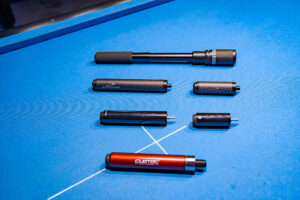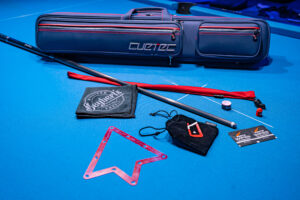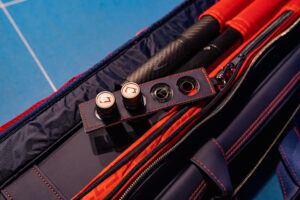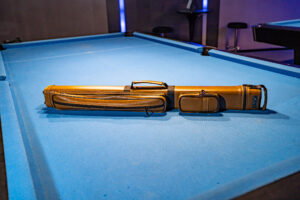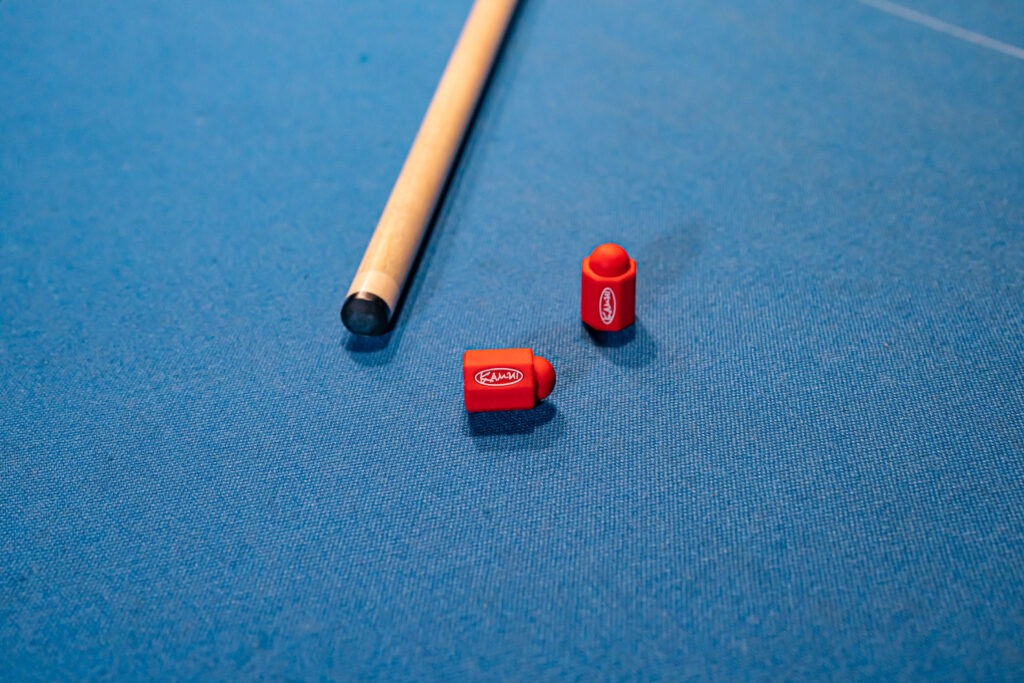
Longoni Shaft with Kamui Red Tip Protectors
So you already have a cue or you are considering to buy one? Or just a shaft? If so, lets look what does softwood cue shafts have to offer and are they what you are looking for to improve your game?
Softwood shafts for pool cues, often made from woods like maple, ash, or poplar, have been a popular choice among players for their unique characteristics. Below is a detailed analysis covering their advantages, disadvantages, susceptibility to humidity, maintenance requirements, and durability:
Advantages:
- Flexibility: Softwood shafts tend to have more flexibility compared to harder woods. This can provide players with better control over their shots, especially when adding spin or English to the cue ball.
- Shock Absorption: Softwood shafts have a natural ability to absorb shock, which can help reduce vibration during the cue’s impact with the cue ball. This can result in a smoother stroke and improved accuracy.
- Feel: Many players appreciate the feel of softwood shafts, finding them comfortable and responsive. The tactile feedback they provide can help players gauge the amount of power needed for each shot more accurately.
- Affordability: Softwood shafts are often more affordable compared to cues made from exotic hardwoods or composite materials, making them accessible to a wide range of players.
Disadvantages:
- Prone to Warping: Softwood shafts are more susceptible to warping due to changes in humidity and temperature. This can affect the straightness of the cue, leading to inconsistencies in shots and requiring more frequent adjustments.
- Less Durability: Softwood shafts are generally less durable compared to harder woods or composite materials. They may develop dents, dings, or other forms of damage more easily, especially with prolonged use or rough handling.
- Limited Customization: Softwood shafts may have limitations in terms of customization options compared to cues made from other materials. This can include fewer choices in terms of taper, diameter, and other specifications tailored to individual preferences.
Susceptibility to Humidity:
Softwood shafts are particularly sensitive to changes in humidity. High humidity can cause the wood to absorb moisture, leading to swelling and potential warping. Conversely, low humidity can cause the wood to lose moisture, resulting in shrinkage and increased susceptibility to cracking or splitting. To minimize these effects, it’s important to store cues in a controlled environment with stable humidity levels and to use protective cases when transporting them.
Maintenance:
Proper maintenance is crucial for ensuring the longevity and performance of softwood shafts!!!
- Cleaning: Regularly clean the shaft with a soft, damp cloth to remove chalk residue, dirt, and oils from the player’s hands. Avoid using abrasive cleaners or solvents that may damage the wood’s finish.
- Shaft Conditioner: Periodically apply a quality shaft conditioner or sealer to help protect the wood and maintain its smoothness. This can also help prevent moisture absorption and minimize the risk of warping.
- Storage: Store cues in a climate-controlled environment away from direct sunlight, extreme temperatures, and fluctuations in humidity. Using a cue case with protective padding can provide additional protection during storage and transportation.
- Inspecting for Damage: Regularly inspect the shaft for any signs of damage, such as cracks, dents, or warping. Addressing issues promptly can help prevent further damage and ensure the cue remains in optimal playing condition.
Durability:
While softwood shafts may be less durable compared to cues made from harder woods or composite materials, proper care and maintenance can help extend their lifespan. Additionally, some players prefer the unique feel and characteristics offered by softwood shafts, prioritizing performance over long-term durability.
Deflection:
Deflection, also known as cue ball deflection or squirt, is a crucial factor to consider when analyzing pool cue shafts, including those made from softwood. Here’s how deflection fits into the analysis:
Deflection refers to the sideways deviation of the cue ball’s path from the intended aiming line when struck with English or side spin. It occurs due to the asymmetrical nature of the cue’s contact with the cue ball, with the cue’s tip imparting force off-center, causing the cue ball to deflect from its initial path.
Softwood shafts can influence deflection due to their flexibility and construction. Here’s how they contribute to deflection:
- Flexibility: Softwood shafts tend to have more flex compared to harder woods. While this can enhance shot control and feel, it can also lead to increased deflection. The greater the shaft’s flexibility, the more potential for the cue ball to deflect off course when struck with side spin.
- Taper and Diameter: The taper and diameter of the shaft can also impact deflection. Softwood shafts may offer different taper profiles and diameters, which can affect how much the cue ball deflects. Thinner shafts or those with more gradual tapers may deflect less than thicker shafts with more aggressive tapers.
- Tip Material and Shape: The material and shape of the cue tip play a significant role in deflection. Softwood shafts are often paired with softer tips, which can compress more upon impact, potentially reducing deflection compared to harder tips. Additionally, the shape of the tip, such as its curvature or diameter, can influence how it interacts with the cue ball and affects deflection.
Managing Deflection:
Players may adjust their aiming and stroke techniques to compensate for deflection, especially when using side spin or English. This involves accounting for the cue ball’s anticipated deviation and aiming slightly differently to achieve the desired outcome. Some cues also incorporate technologies or design features aimed at minimizing deflection, such as low-deflection shafts or specific tip constructions.
Overall Consideration:
When evaluating softwood shafts for pool cues, it’s essential to consider how their characteristics, including flexibility, taper, diameter, and tip selection, affect deflection. While softwood shafts may offer advantages in terms of feel and shot control, players should be aware of the potential for increased deflection and adjust their play accordingly. Ultimately, the player’s preferences, playing style, and skill level will influence the significance of deflection when choosing a cue shaft.
Conclusion:
In conclusion, softwood shafts for pool cues offer distinct advantages in terms of flexibility, shock absorption, and feel. However, they are also prone to warping, less durable, and require careful maintenance to mitigate the effects of humidity and prolong their lifespan. Despite these drawbacks, many players appreciate the responsiveness and tactile feedback provided by softwood shafts, making them a popular choice among enthusiasts of the game.

